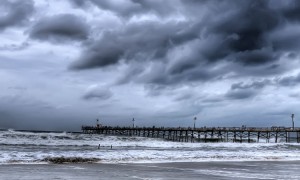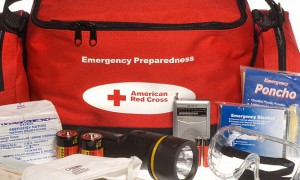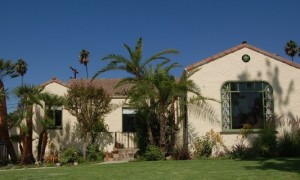When powerful electricity lights up the sky, it can sometimes result in the darkening of our homes. This monsoon season is a perfect example of that—particularly the massive storm that left more than 33,000 people in the dark across the Las Vegas Valley last month.
With a little planning, however, you can avoid the danger and inconvenience of a sudden loss of electricity.
Assemble an Emergency Kit
Meteorologist Chris Stumpf, who works at the Las Vegas Weather Forecast Office for the National Weather Service, recommends stocking your power outage kit with the following:
- A flashlight with extra batteries.
- A weather radio. One that is battery-powered, hand-cranked, and/or solar-powered.
- A first aid kit.
- At least a three-day supply of food and water per person. Easy-to-prepare food such as trail mix, and one gallon of bottled water per person, per day, helps keep you healthy in the event of an extended power outage (more than 10 hours).
- A food thermometer. Perishable foods that reach temperatures above 40 degrees Fahrenheit may no longer be safe to eat.
- Antibacterial towelettes
- Trash bags
- Pen and paper. In case you need to leave, you can post information: when you left, where you’re going, and who’s with you.
Protect Your Home
Flash flooding and triple-digit summer temperatures frequently accompany thunderstorms that produce power outages. Preparing for these events means watching out for your family, then taking measures to prevent damage to your home and property.
- Make an emergency plan. In case you need to leave, identify in advance who will do what, what safe places exist beyond the home, and how to get there. On ready.gov, the Federal Emergency Management Agency offers a downloadable PDF to help you get started.
- Maintain your yard. Thoughtful placement of landscaping can help prevent the toppling of trees onto homes, power lines, and roads. NV Energy can trim existing trees located near power lines.
Protect Your Electronics
Power outages and power surges can leave electronics, and the data on them, vulnerable. NV Energy offers the following tips to protect data, electronics, and other items:
- Use a surge protector for all electronics, including your computer, TV, DVD player and sound systems. Don’t confuse a power strip with a surge protector.
- Consider connect your computer to an Uninterruptible Power Supply (UPS). This back-up battery supplies electricity for about 15 minutes—long enough to save your work. Make sure the device is UL-listed (tested by Underwriter Laboratories).
During an Outage
- Keep doors to freezers and refrigerators closed. Federal food safety officials advise that if the power outage lasts no longer than four hours, the food inside should be salvageable. Once the power is back on, use the thermometer in your supply kit to check food temperatures. Foodsafety.gov offers a handy chart to help determine what must be thrown away.
- Don’t leave children, the elderly, or pets in a home without air conditioning. Heat safety is critical, warns meteorologist Stumpf, who says that is was the main concern during a recent two-hour power outage at his home. “Thankfully the house stayed around 80 to 85. If it had gotten above 90, my cat and I would’ve gotten into my car. You don’t want to leave pets in a hot house,” he says.
- Avoid flooded roads. Power outages accompanied by heavy rains can wreak havoc. Flash flooding can fill streets and washes, or short out electricity in your home. Keep your weather radio nearby to listen for flash flooding alerts. The City of Las Vegas says that if you’re advised to evacuate, do so immediately, and follow recommended routes. However, if you run into high water, never attempt to walk or drive through flood waters. Turn around and seek higher ground.
Remember, that a few proactive habits can help offer peace of mind and enhance your safety during an outage.
This post comes from the Allstate Las Vegas Blog, which helps locals prepare for the unpredictability of life.
[cf]skyword_tracking_tag[/cf]






